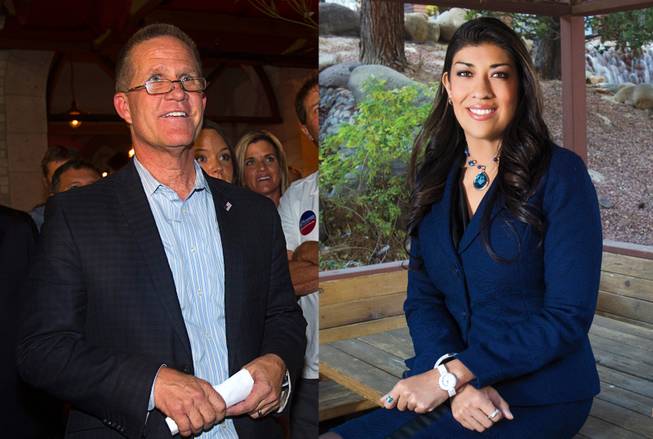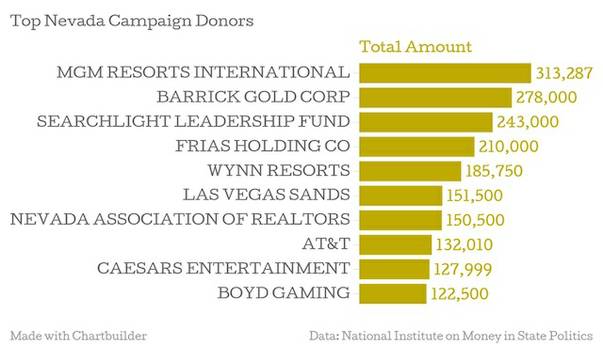
Sun Staff
Republican Mark Hutchison and Democrat Lucy Flores will face off in the lieutenant governor’s race in the general election in November 2014.
Tuesday, Oct. 14, 2014 | 2 a.m.
Nevada voters get a new look today at who’s spending money to influence upcoming state and local elections.
Candidates in the Nov. 4 election must file new campaign finance reports today. While campaigns have been at full throttle since the primary election this summer, today's report will be the first one since June 6.
So far, there have been 17,597 contributions totaling nearly $24 million made to Nevada candidates up for election this fall, according to data from the National Institute on Money in State Politics.
Here’s what you need to know about how campaign finance works in Nevada:
The figures are up to date as of June 6 and provided by the nonprofit and nonpartisan National Institute on Money in State Politics.
What are Nevada’s campaign finance rules?
Nevada candidates are required to disclose their campaign contributions four times in the year leading up to the general election: once in May, once in June and twice in October. The way the reporting deadlines are scheduled leaves a four-month gap — June to October — where candidates can fundraise and spend outside the public eye. A final post-election report is due in January.
Any contribution of $100 or more must be reported, including the name and address of the donor.
Donors are limited to giving a maximum of $10,000 to any individual candidate — $5,000 for the primary election and another $5,000 if they make it to the general election.
Political action committees — independent groups not affiliated with specific candidates — that are active in Nevada elections are also required to report contributions and spending.
Failure to follow the state’s rules could result in fines of up to $5,000 per violation.
Candidates for federal office operate under a different set of rules overseen by the Federal Election Commission. In addition to lower maximum contribution limits, federal candidates are required to report their fundraising totals each quarter.
How do our disclosure laws compare to other states?
Nevada’s campaign finance rules are among the weaker ones in the nation, according to a study by the State Integrity Investigation that rated Nevada's laws 35th.
The study faulted Nevada for not capping contributions to state political parties, lax auditing practices and light punishment for violators of campaign finance law.
The $10,000 maximum contribution to candidates is also higher than many other states and can be easily circumvented.
Secretary of State Ross Miller proposed new rules in 2013 that would have required candidates to disclose any contributions of greater than $1,000 within 72 hours. But the bill was watered down by the Legislature and the faster reporting turnaround is now only required during early voting.
Why do donors contribute to campaigns?
Donors give money to political campaigns for a variety of reasons.
Individual donors might support a candidate for their stance on a particular issue or their party affiliation.
The same goes for many political action committees.
But for businesses, political giving is often less about ideology and more about practicality. Donating to a candidate builds a relationship and gives the business better access if that candidate ends up winning.
As a result, many businesses spread their contributions to members of both parties, with more money generally flowing to the party that controls the Legislature.
Who are the top donors in this election?
Like previous election cycles, Nevada political giving is dominated by the state’s most powerful gaming, tourism and mining companies.
Leading the way is MGM Resorts International, which has given 65 contributions totaling $313,287 to candidates and political party committees through June, according to data from the National Institute on Money in State Politics.
Coming in second is Barrick Gold Corp., which has made 90 contributions totaling $278,000 to candidates and political committees. Las Vegas Sun owner and publisher Brian Greenspun is a member of the Barrick Gold Corp. board of directors.
Other casino companies among the top 10 largest campaign donors are Wynn Resorts, Las Vegas Sands Corp., Caesars Entertainment and Boyd Gaming.
Non-gaming entries among the top 10 include Sen. Harry Reid’s Searchlight Leadership Fund, a political action committee that is the state’s third-largest contributor at $243,000; and Frias Holding Co., the state’s largest operator of taxicabs and limousines, which has given $210,000.
What Nevada races are drawing the most interest from donors?
With no marquee races for governor or U.S. Senate on the ballot, much of the attention has shifted to down ticket races. The money has followed.
In the lieutenant governor’s race, Republican Mark Hutchison has amassed a war chest of $1.4 million for his face-off with Democrat Lucy Flores, who has raised $348,000.
In the race for attorney general, Democrat Ross Miller has raised $1.3 million while his challenger Adam Laxalt has raised $606,000.
The balance of power in the state Senate could pivot depending on the outcome of the Senate District 9 race. That has led to a fundraising bump for the two candidates running. Incumbent Democrat Justin Jones has raised $512,000 and his Republican challenger Becky Harris has brought in $261,000.


Join the Discussion:
Check this out for a full explanation of our conversion to the LiveFyre commenting system and instructions on how to sign up for an account.
Full comments policy